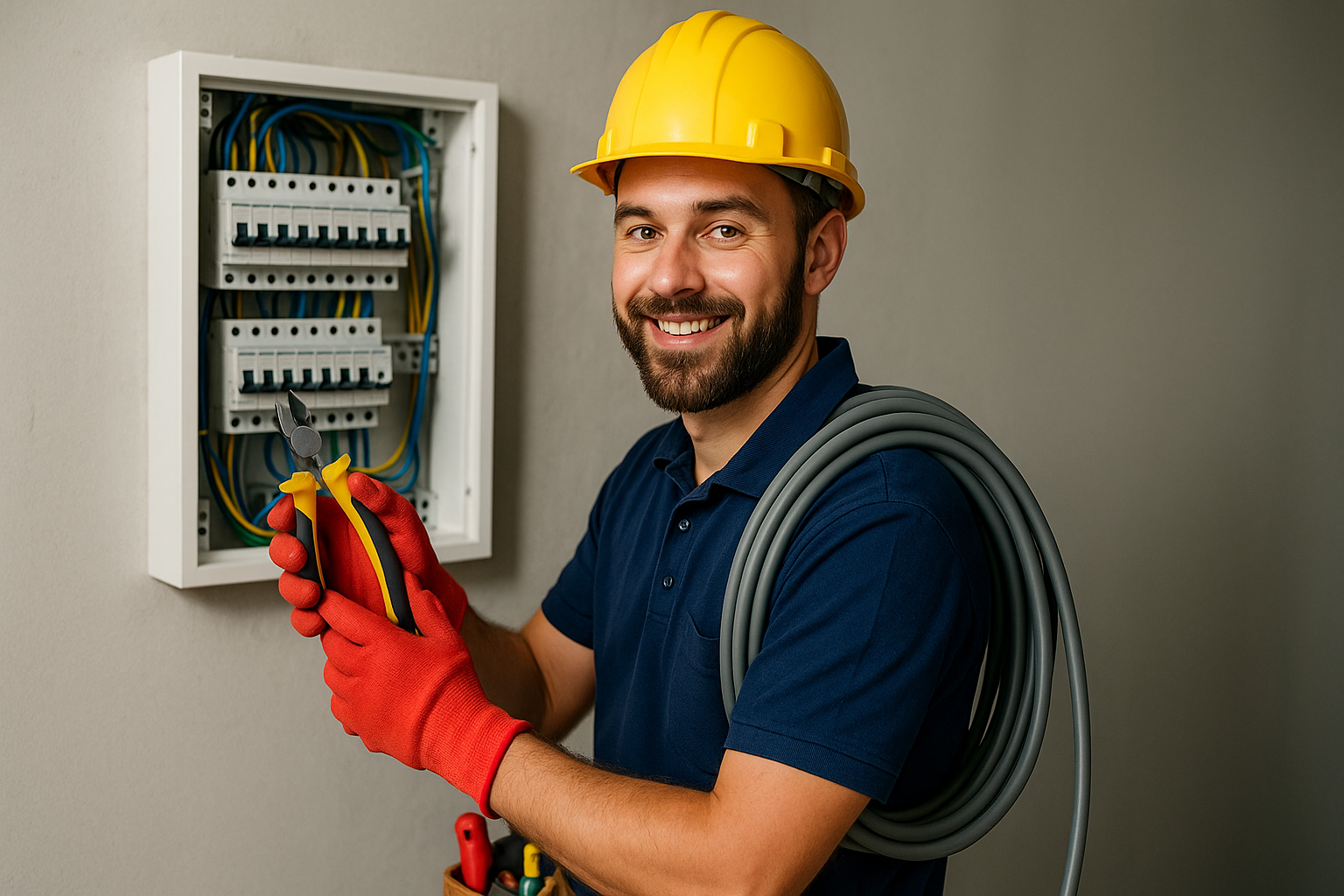Electricity is something most of us use every day without thinking about it. It powers our lights, appliances, gadgets, and more. But when something goes wrong, electrical issues can become dangerous very quickly. Problems that seem small like a flickering light or a warm outlet can lead to bigger risks such as electrical fires, electric shocks, or damage to your home.
The good news is that most electrical issues show early warning signs before they become serious. By knowing what to look for, you can catch these problems early and keep your home safe. Below are the most common signs to watch for and what they mean.
Circuit Breakers That Keep Tripping
Circuit breakers are designed to cut power when there’s too much electricity flowing through a circuit. This protects your home from electrical fires. If a breaker trips once in a while, it’s usually not a big deal. But if it keeps happening, something is wrong.
Why it happens:
-
Too many devices plugged into one circuit
-
A short circuit caused by faulty wiring
-
A ground fault, where electricity escapes the circuit
What to do:
Unplug some devices and reset the breaker. If it trips again, contact an electrician. Frequent tripping means your system is overloaded or damaged and needs professional attention.
Flickering or Dimming Lights
Lights that flicker, dim, or buzz are common signs of electrical issues. This can happen when large appliances are turned on, or it can occur randomly.
Possible causes:
-
Loose wiring
-
Overloaded circuits
-
Faulty light fixtures
-
Voltage fluctuations
What to do:
Check if the bulb is loose or faulty. If the problem continues, you may have a wiring issue that needs an electrician’s help. Don’t ignore persistent flickering – it could indicate a serious problem behind the walls.
Burning Smells or Scorch Marks
If you ever smell burning near outlets, switches, or your electrical panel, turn off the power immediately. A burning smell is one of the most serious warning signs and usually means wires or components are overheating.
Other warning signs:
-
Brown or black marks on outlets or switches
-
Plastic or rubber smell
-
Outlets or switches that feel hot
What to do:
Stop using the affected outlet and call an electrician right away. Electrical fires can start suddenly, so don’t delay.
Warm or Hot Outlets and Switches
Outlets and switches should always feel cool or just slightly warm. If they’re hot to the touch, it’s a sign that too much current is flowing or there’s a wiring problem.
Why it’s dangerous:
Overheating can cause wires to melt, leading to sparks, fire, or damage to the electrical system.
What to do:
Stop using the outlet and contact a professional. They may need to replace the outlet or fix faulty wiring.
Buzzing, Crackling, or Popping Sounds
Electricity should be silent. If you hear buzzing, crackling, or popping sounds from outlets, switches, or your breaker panel, something is wrong.
What causes the noise:
-
Loose wiring
-
Damaged insulation
-
Electricity arcing between connections
What to do:
Turn off the power in that area and call an electrician immediately. Arcing is dangerous and can quickly start a fire.
Shocks or Tingling Sensations
Feeling a mild shock or tingling when you touch an appliance, switch, or outlet is a serious warning. Electricity may be escaping the circuit and traveling through you – a sign of a dangerous fault.
Why it happens:
-
Faulty grounding
-
Damaged appliances
-
Moisture near electrical components
What to do:
Unplug the appliance or turn off the power to that circuit. Don’t use it again until it’s inspected. Installing ground fault circuit interrupters (GFCIs) in wet areas like kitchens and bathrooms adds extra safety.
Outdated Electrical System
Older homes often have electrical systems that weren’t built to handle today’s power needs. If your home is more than 30 years old and hasn’t had an electrical upgrade, problems may already be developing.
Warning signs:
-
Breakers trip often
-
Lights dim when appliances are used
-
Heavy reliance on extension cords
-
Outlets can’t fit three-pronged plugs
What to do:
Have a licensed electrician inspect your home. Upgrading your panel and wiring will make your electrical system safer and more reliable.
Damaged or Old Wiring
Wiring doesn’t last forever. Over time, it can wear out, fray, or be damaged by rodents. Faulty wiring is one of the leading causes of electrical fires.
Warning signs:
-
Frequent power outages
-
Flickering lights
-
Burning smells
-
Sparking outlets
What to do:
Get a professional inspection, especially if your home is older or you suspect hidden damage. Replacing old wiring can prevent future hazards and keep your home up to code.
Overuse of Extension Cords
Extension cords are handy for occasional use, but they’re not meant to be permanent solutions. Using too many can overload your system and create a fire risk.
Why it’s risky:
Excessive use of extension cords means your home doesn’t have enough outlets or that your circuits are overloaded.
What to do:
If you need extension cords all the time, have an electrician install additional outlets or add new circuits to handle your power needs safely.
Final Safety Tips
Catching electrical problems early can save you from expensive repairs and dangerous accidents. Here are some final tips to keep in mind:
-
Don’t ignore warning signs. Even small issues like flickering lights or warm outlets can indicate bigger problems.
-
Schedule regular inspections. A licensed electrician can check for hidden dangers and make sure everything is safe.
-
Upgrade when necessary. Older systems may not be able to handle modern power demands. Updating wiring, outlets, and panels improves safety and performance.
-
Use safety devices. Ground fault and arc fault circuit interrupters (GFCIs and AFCIs) can prevent shocks and fires.
Electrical problems rarely happen without warning. Most of the time, they give you small clues first – a breaker that trips too often, a strange smell, a buzzing sound, or a warm outlet. These signs are your home’s way of telling you that something isn’t right.
The key is to pay attention and act quickly. Don’t try to fix electrical issues on your own unless you’re qualified. Always contact a licensed electrician to diagnose and repair the problem safely. By catching early warning signs and taking preventive steps, you’ll keep your home safe, protect your property, and ensure that your electrical system runs smoothly for years to come.

